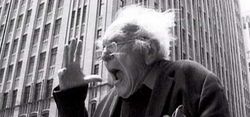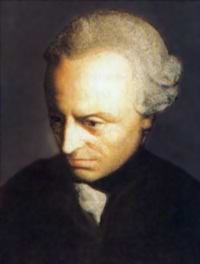Ontological Argument
“Alright, think of a dick greater than which no larger can be conceived... It's mine.”
– Oscar Wilde on The Ontological Argument
The Ontological Argument was a famous argument for proving the existence of God, one's self, big islands, the Flying Spaghetti Monster, Russell's teapot and anything which can be described as great.
History[edit | edit source]
The argument, it is believed, was first thought up by the young St. Anselm of Canterbury, who was very prone to be ontological, and was hung like a donkey. It appears from relevant sources, that he was only of 6 years of age when he invented the argument. The young Pope Urban II had placed a bet (of three mars bars and a plastic soldier) that Anselm could not prove the existence of God, because in his opinion, revelation was the only truth . Anselm replied thus:
- Imagine the bestest thing you can imagine (for example my cock) .
- Right, now imagine it not existing.
- But then, it wouldn't be the bestest thing you could imagine, would it?
- Because existing would make it even better.
- Therefore, God exists (because he is the bestest)!
- Hand over the chocolate .
This source was only discovered by an assistant curator in the Vatican libraries in 1877, because it was considered immensely shocking that a Pope and a Saint were prone to gambling.
However, many other great philosophers have been influenced by this. Russell used the same argument to prove his omnipotent teapot. Worshippers of the Flying Spaghetti monster have submitted this variation:
| “ | Let us imagine that which is more noodly than anything else. If this object was not existent, then we could imagine an object more noodly, for it is sure that the object which did not exist was incapable of being noodly at all, because being noodly implies existence and thus it cannot be noodly. Therefore the Flying Spaghetti monster exists. | ” |
Disproof[edit | edit source]
Kant provided an early form of disproof to this most noted argument, but that which we shall agree to being the most proofing is that which was written by Hegel (annoyingly enough, he could only proof his disproof's existence using the same argument he was disproving, as disproofs, being devoid of content, are also devoid of spirit). This disproof has been simplified, but we present it in the original formulation, albeit translated, below it.
Firstly, let it be taken that Spirit (S) is the same as the content of our Souls (So) The ontological argument is Ontological (O) and thus produces a special feeling of Ontologicalishness in our souls (FO-So/S) There are 38,489 published books which make reference to the Ontological argument. The amount of items which can be proved by the Ontological argument are either 0, if this argument is correct, or Aleph-null. So
This is impossible to solve, however, if the ontological argument was true, we would have to solve such mind bending problems whenever we thought about God and Spirit. This argument may appear very weak and appears to obfuscate rapidly, but once you have read all Hegel's major works, minor notes, and lecture notes, it should become vaguely more lucid for you.
Counter-Disproof[edit | edit source]
It has been argued that can be neatly rearranged to , because the addition of infinity means that the sum of the top of the fraction is going to be infinity in any case. However, one notices here, that 196741925136 is 666 cubed! God would not let anything valid contain such an evil number! Therefore, Hegel was a heretic and we should discount his output in the matter. Also Nietzsche said "God is Dead", and God is part of spirit and so Spirit is dead, and Spirit is everything (according to Hegel), so everything is dead, which is obviously wrong.One of these statements must be false. Nietzsche is generally more reliable as a philosopher, so thus we shall decide everything that Hegel says to be false.
Counter-Counter-Disproof[edit | edit source]

“The fact that Nietzsche made a comment as to that I was boring, shows he lacks soul, and thus should not be allowed to say anything in public”
– Plato on Counter-Counter-Disproof of the ontological argument
“You mean Spirit, not Soul?!”
– Hegel on Counter-Counter-Disproof of the ontological argument
The argument at this point turned to personal quarrels, unfortunately so prelevent within philosophical circles. Despite this, God is Dead has never been a proven theorem, because of this horrible argument constructed by Max Stirner:
- Being dead is dependent on having once been alive
- If God existed, he wouldn't be so dim as to be alive, because God likes himself (like everyone) and we like Satan, who doesn't like God, and anyone who disagrees with me only exists in my imagination, so I'm not going to listen to their objection to this point.
- We prefer Satan anyway
- Christians think that benevolence makes you greater, but it is actually a weakness, and the ontological argument proofs the existence of Satan.
- Christians wouldn't want that
- The Rector of the university where I teach is a Christian
- It is my primary duty to serve myself-ie: make lots of money and get drunk.
- The Rector would find someone less prone to arson if he knew I had successfully proved that Satan exists more necessarily than God.
- He would basically be jealous of me.
- I like provoking envy, but that is besides the point
- Don't I just love to go on about myself ?
- Thus the Ontological argument is disproved through a parable of my immense greed. I have also shown the guy who wrote the counter-disproof to be an idiot on the way. Am I not the cleverest person who has ever lived ? YES (but only because no one else exists)
Some people (especially notorious atheists like Bertrand Russell) have argued that nothing in Hegel makes any sense, and his disproof is a load of trash. We personally make lots of money by selling his books, so we think that these people are just jealous.
Alternate formulations[edit | edit source]
Unfortunately, the author of the article at this point read a book by Schopenhauer and stopped eating for philosophic reasons. We are currently waiting for him to leave coma.




